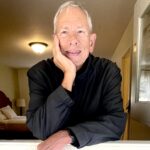The Nightstand 453
Beyond the Mechanism: An Economist Grapples with Statesmanship
When we refuse to engage our fellow citizens, we are also taking a public position. There is such a thing as non-partisan economics. But there is no such thing as…
For Nancy French-ism
This is the story of a bruised soul touched by grace but still frustrated by the passivity that others continue to show in response to the unspeakable.
Shakespeare’s Grief
After a pandemic took his son, the Bard would never be the same
The Excellence (and Implications) of Escaping the Housing Trap
All of this only touches the surface of Escaping the Housing Trap’s arguments and only begins the many productive discussions that should—and hopefully will!—follow in its wake. Buy and read…
Laughter is Courageous: A Review of Empire Between the Lines
As such, these papers provide the means for understanding how imperial concerns shaped the way Entente soldiers perceived themselves and the war. But even more importantly to my mind, the…
Travels in Exotic Nebraska: A Review of American Harvest
The book is at its best when it embraces a more generous spirit. If one wishes to learn about traveling grain harvesters and to follow a literary description of the…
Thinking About Wendell Berry’s Leftist Lament (and More)
[Cross-posted to In Medias Res] Wendell Berry’s sprawling, uneven, brilliant, and sometimes frustrating The Need to Be Whole: Patriotism and the History of Prejudice will likely not, I think, be…
Public Enemy #1?: Smartphones and a Generation at Risk
Haidt’s book is a tour de force. I can give it no higher praise than to say I wish we could put this book in the hands of every parent,…
“I Wouldn’t Take Nothing for It”: An Appreciation of Love for the Land
“Heeding lessons from farmers who persist in place, we can embrace these virtues. Rather than give up or get out, we can dig in. Rather than go big, we can…
Frog and Toad Might Just Be Friends…and That’s Okay
If we fail to recognize friendship for what it is, and for the role it plays in the maturation process of children and young adults, we lose out on a…
At Home with Dragons
The past is not completely lost to us, and the fascination with fantastic beasts remains.
Monuments to Human Stupidity? A Review of David Betz’s A Guarded Age
The film Patton contains many quotable quotes, some of which cannot be repeated on a family friendly website such as Front Porch (for example, what it might have been like…
Finding a Home Field: A Review of In Thought, Word, and Seed
If I am therefore departing one field in which I hoped to do some good work in place, I hope to deepen my practice as an English professor who lives…
Rooted Lives or Activist Lifestyles?
In a world in which there are so many problems to solve, solitude plays an important role in helping us remember that life consists of more than finding and righting…
The Timeless Way of Building: A Review
Why is it that we can all say that this building works, that this room is just right, that this town is good and pleasing? Why is it that we…
Bewilderment My Bow: A Review of Zero at the Bone
How are all these entries against despair? Insofar as metaphor is an act that creates meaning, it’s an act of hope: even intractable realities can be changed by placing them…
Localism Not Integralism: A Review of All the Kingdoms of the World
Self-government by local communities, including some tiny confessional states, would be more consistent with ideals of diverse, self-governing communities.
Boys in the Boarding School
If boarding school stories are exceptionally good at communicating certain universal themes despite the privileged setting, the lasting appeal of the setting offers some lessons, as well. The older we…
Two Leftists Walk Into a Pandemic . . .
Not only did the worst consequences of lockdowns occur in the Global South, but lockdowns were pushed on the South from the North, through well-known strongarm tactics of neocolonialism that…
The Art of Activism: Conflict and Conversation in Mitali Perkins’ Hope in the Valley
Activism needs to begin by fearlessly staring down our own prejudices, by rooting out the injustices we allow. Once that is accomplished, we can turn to the outer world
Politics Before History
It is an MSNBC segment with pseudo-historical gloss. Billed as a warning to American democracy, it is a simple yet pretentious work that will do nothing to solve the problems…
New Beginnings: A Conversation with David Heddendorf about his Novel, The Terra Cotta Camel
David Heddendorf’s novel, The Terra Cotta Camel, is, as the subtitle accurately puts it, about “hope, new beginnings, and Des Moines.” It is about the small, the local, and the…
Marriage Will Kill You (And That’s Good)
You can either have a hard marriage or an unhealthy marriage. These are your options. And Key not only made me feel normal, but he made me want to live…
For the Love of Books
Out-of-sight, out-of-mind is the quintessential modern American problem-solving strategy, and it sure does have a lot going for it, when it comes to dealing with our problem of stuff—that other…






















